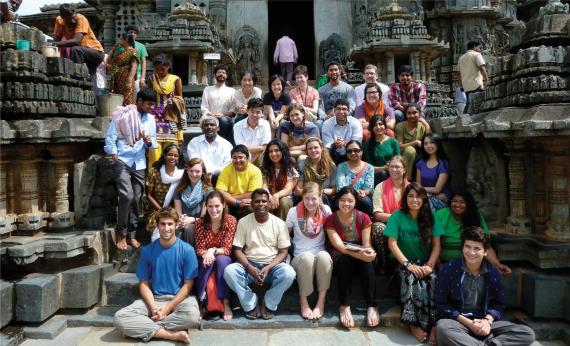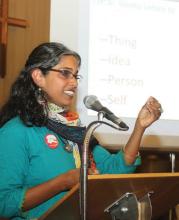With 22 of her undergraduate students, CHID & English faculty Dr. Anu Taranath has recently published TIPS to Study Abroad: Simple Letters for Complex Engagement (Flying Chickadee, 2014). TIPS to Study Abroad showcases a letter-writing assignment Taranath designed for her students while abroad in India, and helps travelers of all kinds deepen their connection to their journeys. Students were invited to pen weekly handwritten letters to TIPS—an acronym for Things, Ideas, People and Self—and produced a range of funny, insightful, poignant and provocative letters. To what or to whom did students write letters? Here’s a sample:
Dear Plastic Water Bottles;
Dear Sweet Autorickshaw Driver;
Dear Generosity;
Dear Girl I Read About in the Papers who was Bitten by a Snake and Died;
Dear Contradiction;
Dear Chai Breaks;
and Dear Poop!
A simple project at its core, TIPS to Study Abroad lays the groundwork for powerful reflections about culture, race, gender, identity, globalization and the role of travel in our wide world.
A unique feature of TIPS to Study Abroad is that all the book’s proceeds support three organizations in South India that have been collaborating with Taranath’s study abroad program the past decade:
- Hengasara Hakkina Sangha (HHS), a women’s rights organization known for their thoughtful approach to intersectionality and gender, works to build capacity in rural women’s collectives on legal and social issues.
- Through public campaigns, education and legal interventions, Environment Support Group (ESG) continues to serve as a leading voice and force of the Indian environmental justice movement.
- And at the Centre for Collective Dialogue and Change (CCDC), innovative performers and facilitators use participatory theatre to create conversations on social issues across the nation.
Despite its small local roots, TIPS to Study Abroad has been adopted by a wide assortment of organizations, institutions and educators to offer a new and accessible model of critical global engagement. At the University of Washington, study abroad programs to Italy, Spain and South Africa, Pipeline Project, Alternative Spring Break, and First Year Experience Program have all used TIPS to Study Abroad. Outside of the UW, the book has been used by a Seattle-based international travel company, on study abroad programs run by Duke University and Occidental College, in Puget Sound area high schools, and in classes taught at various universities and colleges around the country. While this kind of reach is indeed rewarding, the book’s impact on its student authors is its real success. Says one participant-author, “Seeing my letters in TIPS to Study Abroad fills me with such pride! Our time in India, and the entire process of putting our book together, remind me daily of my commitment to thoughtful global engagement.”

